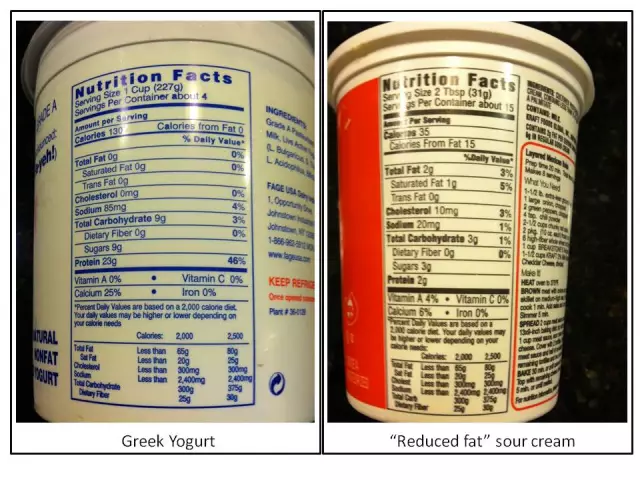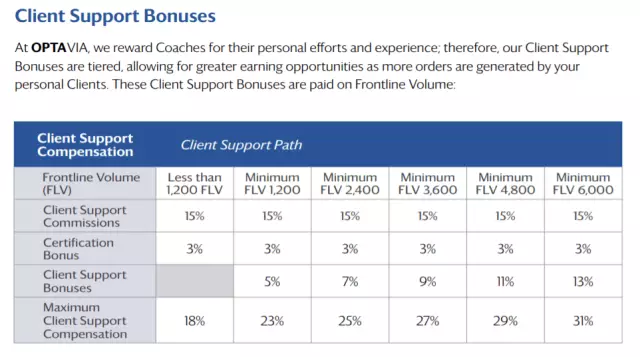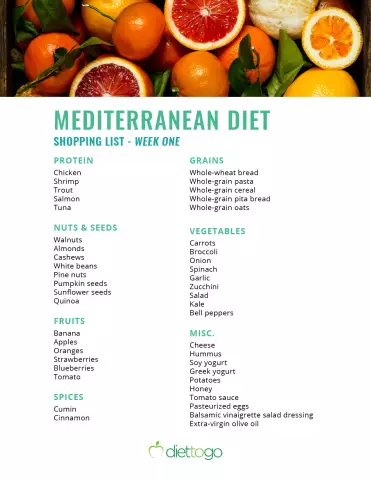- Author Rachel Wainwright wainwright@abchealthonline.com.
- Public 2023-12-15 07:39.
- Last modified 2025-11-02 20:14.
Greek diet
The inhabitants of the Mediterranean coast are in better health than their European neighbors. Scientists say that it is thanks to the special nutrition that the coastal areas suffer less from metabolic disorders, heart and oncological diseases.
The "Greek diet" is a variant of the Mediterranean diet, it allows you to reduce weight, making your body healthy.
The diet does not have a clearly scheduled menu and meal schedule. Weight loss occurs due to the formation of healthy eating habits and the normalization of metabolism, slowly and gradually, without feeling acute hunger. You can stick to this power system for a long time. Then, after reaching the optimal weight, it stops decreasing, the result is consolidated and maintained. The minimum period for the Greek Diet is seven days.
The main foods in the diet are fish and seafood (sources of protein), pasta and cereals (sources of complex carbohydrates), vegetables and fruits (sources of vitamins, minerals and fiber).
The rules of the "Greek diet":
- fractional meals - at least five meals a day in small portions;
- hearty breakfast;
- light snacks are allowed (fruits, vegetables and dairy products);
- during the day, you should drink at least 1.5 liters of water.
Do not forget about regular physical activity, you can do any kind of it - swimming, fitness, yoga, Pilates, dancing, etc.

Advantages of the "Greek diet"
The Greek Diet helps you lose 1-2 kg per week.
The prescribed diet and range of products have a positive effect on health. The condition of the digestive system, skin, hair and nails improves, immunity is strengthened, headaches cease to torment, chronic fatigue disappears, sleep is normalized.
You don't have to starve during the Greek Diet. A rich diet and delicious dishes make this food system easy to follow and allow you to practice it for a long time.
Disadvantages and contraindications of the "Greek diet"
The “Greek diet” is not suitable for those who do not like or otherwise cannot eat fish or seafood. It is also not recommended for kidney disease, gastric ulcer or duodenal ulcer.
What foods are allowed?
Within the diet, three food groups are distinguished:
- Consumed daily.
- Those present on the menu 1-4 times a week.
- Those present on the menu no more than 3-4 times a month.
Group 1:
- bread (dark or whole grain);
- cereals (mainly rice);
- pasta;
- legumes;
- vegetables;
- sunflower and pumpkin seeds, nuts;
- fruit;
- dairy and fermented milk products;
- extra virgin olive oil;
- high quality natural red wine (two glasses a day for women and three for men);
- tea and black coffee.
Group 2:
- fish and seafood - 3-4 times a week;
- eggs - 2-3 times a week;
- honey and black bitter chocolate - 1-3 times a week.
Group 3: lean meats and poultry.
What foods are prohibited?
- Sugar and any sweets.
- Salt.
- Fatty food.
- White bread and baked goods.
- Canned food.
- Fast food.
- Carbonated drinks.
- Any alcohol other than natural red wine.
Greek Diet Menu
Sample menu "Greek diet" for three days:
First breakfast: 2 toast with cheese, fruit or vegetable salad, coffee with milk.
Second breakfast: yogurt.
Lunch: a slice of grilled chicken, green bell pepper and red onion salad with sunflower seeds.
Afternoon snack: fruit salad.
Dinner: rice and stewed vegetables, mint tea.
First breakfast: 2 tomatoes stuffed with shrimps, black coffee.
Second breakfast: fruits, a handful of nuts.
Lunch: cold vegetable soup, baked eggplant.
Afternoon snack: Greek salad (tomatoes, cucumbers, olives, feta cheese, herbs, olive oil).
Dinner: vegetable casserole of tomatoes and zucchini with goat cheese, tea.
First breakfast: cottage cheese with honey, black coffee.
Second breakfast: a serving of green vegetable salad, yogurt.
Lunch: spaghetti with homemade tomato sauce, tomato, basil and purple onion salad.
Afternoon snack: lavash roll with feta cheese and tomatoes.
Dinner: eggplant casserole sprinkled with pumpkin seeds.
Useful Tips
Advice 1. If it is difficult to immediately give up salt, you can use it in dishes in small quantities - less every day until it is no longer necessary.
Tip 2. The optimal time for the "Greek diet" is summer and early autumn.
| Diet characteristic | final grade |
| Duration: from 7 days |
3.5 out of 5 The Greek Diet is based on traditional Mediterranean cuisine - an abundance of vegetables and fruits combined with fish and seafood. The diet is good for health, and you can follow it for as long as you like. |
| Recommended frequency: any | |
| Weight loss rate: | |
| Safety: | |
| Variety of products: |
YouTube video related to the article:
Found a mistake in the text? Select it and press Ctrl + Enter.






